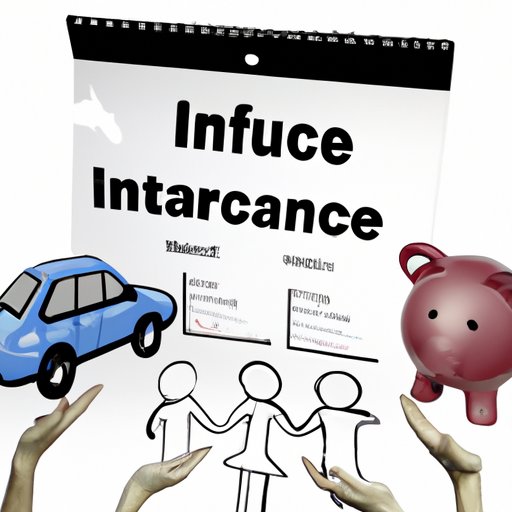
Introduction: Explaining What Insurance Costs and How It Can Vary
In a world where the unexpected can happen at any moment, having insurance is essential for protecting your finances. But as you shop around for insurance, you may wonder just how much it will cost you each month. The answer depends on several factors, including the type of insurance, the coverage level, and other personal details.
We’ll look at the average cost of insurance by type and coverage level, explore the factors that determine the price of insurance, examine common discounts and strategies to lower premiums, investigate state regulations impacting insurance costs, assess insurance companies and their rates, and highlight the benefits of comprehensive insurance coverage.
Comparing the Average Cost of Insurance by Type and Coverage Level
The cost of insurance varies based on the type of policy and the level of coverage you choose. Here’s a look at the average cost of insurance by type and coverage level.
Health Insurance
According to the Kaiser Family Foundation, the average monthly premium for individual health insurance in 2020 was $440, while the average premium for family coverage was $1,168. However, if you qualify for a subsidy through the Affordable Care Act, your monthly premium could be significantly lower. On the other hand, if you don’t qualify for a subsidy, your monthly premium could be significantly higher.
Auto Insurance
The average annual cost of auto insurance in the United States is $1,548, or about $129 per month. This average rate is based on drivers with good credit, no tickets or accidents, and minimum coverage. If you have tickets or accidents on your record, your premiums may be higher. If you choose higher levels of coverage, such as collision and comprehensive, your premiums will also be higher.
Homeowners/Renters Insurance
The average cost of homeowners insurance in the United States is $1,211 per year, or about $101 per month. However, the cost of renters insurance is typically much less expensive. According to the Insurance Information Institute, the average cost of renters insurance is just $180 per year, or about $15 per month. Again, the cost of your insurance will depend on the level of coverage you choose.

Exploring Factors That Determine the Price of Insurance
Your age, gender, location, driving history, and credit score are all factors that can affect the cost of your insurance. Let’s take a closer look at each factor.
Age
Generally speaking, younger drivers tend to pay more for auto insurance because they are considered to be riskier drivers. As you get older, your premiums may decrease. Similarly, seniors may pay more for health insurance because they tend to use it more often than younger people.
Gender
In some states, gender can also affect the cost of auto insurance. In general, women tend to pay less for auto insurance than men, although this gap is narrowing in recent years.
Location
Where you live can also impact the cost of your insurance. For example, auto insurance tends to be more expensive in densely populated areas because there are more cars on the road, which increases the chances of an accident. Similarly, homeowners insurance may be more expensive in areas prone to natural disasters, such as hurricanes and floods.
Driving History
Your driving history can have a significant impact on the cost of auto insurance. If you have a clean driving record, your premiums will generally be lower. However, if you have tickets or accidents on your record, your premiums may be higher.
Credit Score
Your credit score can also affect the cost of your insurance. Insurers use credit scores to assess risk, so if you have a low credit score, your premiums may be higher.
Examining Common Discounts and Strategies to Lower Your Premiums
There are several strategies you can use to lower your insurance premiums. Here are some of the most common discounts and strategies.
Bundling Policies
Many insurance companies offer discounts for bundling multiple policies. For example, you may be able to get a discount if you bundle your auto and homeowners insurance. Make sure to ask your insurer about potential discounts.
Increasing Deductibles
You may also be able to lower your premiums by increasing your deductibles. Keep in mind that if you do make a claim, you’ll have to pay more out-of-pocket before your insurer pays.
Taking Advantage of Low Mileage Discounts
If you drive fewer miles each year, many insurers offer low mileage discounts. To qualify, you may need to provide proof of your annual mileage.

Investigating State Regulations Impacting Insurance Costs
State regulations can also affect the cost of your insurance. Here are two of the most common state regulations that impact insurance costs.
No-Fault Laws
Some states have “no-fault” laws, which mean that your insurance company will pay for your medical expenses and lost wages regardless of who is found to be at fault in an accident. These laws tend to result in higher insurance premiums.
Minimum Coverage Requirements
Each state has its own minimum coverage requirements for auto insurance. Depending on the state, these requirements can vary significantly. Make sure to check your state’s laws to ensure you are meeting the minimum coverage requirements.

Examining Insurance Companies and Their Rates
When shopping for insurance, it’s important to compare quotes from multiple insurance companies. Be sure to compare both the cost and the coverage offered. You should also review the financial strength ratings of each company to ensure they’re financially stable.
Comparing Quotes
It’s important to compare rates from multiple insurance companies. Make sure to compare not only the cost but also the coverage offered. Consider your needs and budget when making your decision.
Reviewing Financial Strength Ratings
In addition to comparing rates, you should also review the financial strength ratings of each company. Financial strength ratings give you an indication of the company’s ability to pay claims. Look for companies with high ratings from organizations like A.M. Best and Standard & Poor’s.
Highlighting the Benefits of Comprehensive Insurance Coverage
Having comprehensive insurance coverage provides peace of mind and protects your assets. Here are some of the key benefits of comprehensive insurance coverage.
Protecting Your Assets
Having comprehensive insurance coverage means that if something unexpected happens, you won’t have to bear the full financial burden yourself. Instead, your insurance will cover some or all of the costs, depending on your coverage.
Providing Peace of Mind
Having comprehensive insurance coverage also provides peace of mind. Knowing that you’re covered in case of an emergency can help you sleep better at night.
Conclusion: Summarizing the Benefits of Shopping Around for Insurance
Having insurance is essential for protecting your finances, but it’s important to shop around for the best rates. The cost of insurance can vary significantly based on the type of policy, the coverage level, and other personal factors. Make sure to compare quotes from multiple insurance companies and review their financial strength ratings. Taking advantage of discounts and increasing deductibles can help lower your premiums. Finally, remember that having comprehensive insurance coverage provides peace of mind and protects your assets.
(Note: Is this article not meeting your expectations? Do you have knowledge or insights to share? Unlock new opportunities and expand your reach by joining our authors team. Click Registration to join us and share your expertise with our readers.)
